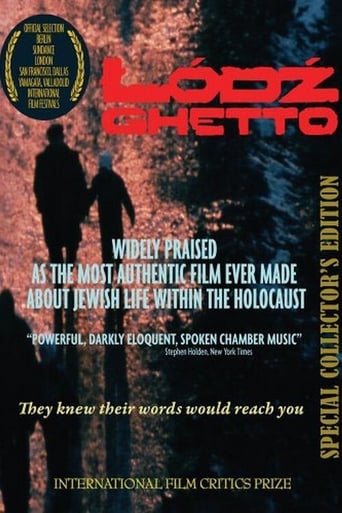Perception_de_Ambiguity
A documentary about life in the Polish Jewish ghetto Łódź (aka Litzmannstadt Ghetto) from 1939 to 1945. It uses the same basic approach as the films by brilliant documentarians Nicole Rittenmeyer and Seth Skundrick, completely chronological, no third person narrator (but diary entries that were written at the time, serving as narration), and archive footage, not to say found footage. It doesn't follow this approach as rigorously as the documentaries by the aforementioned team (there's some contemporary footage of the streets and buildings in there and apparently also some diary entries that can't be accounted for), but that all those written accounts and this footage from inside the ghetto exists is amazing and especially the photographs (taken by ghetto resident Henryk Ross) have a real artistry to them. With its atmosphere of funereal quiet it's a compelling watch not only as a historical document but also as a mood piece. If you want to know what it was like to live in a ghetto in Nazi-occupied Europe this is the real deal.Alan Adelson's short postscript 'Sequel to Lódz Ghetto' (1992), which usually comes as an extra with home video releases, is both a making of and an extension of this documentary that unlike the feature film uses interviews with survivors. Serving as a companion piece to 'Lodz Ghetto' it does a lot in its brief 14 minutes and also is very much worth seeing.
Michael Neumann
When I first saw it on the big screen in late November of 1989, this heartbreaking true story of the notorious staging ground (one of the largest) for Hitler's Final Solution provided a heavy dose of reality in a season normally devoted to blockbuster fantasy...but it was also one of the stronger films of that or any year. Of course by now the facts about the Holocaust are all too familiar, and the fate of the Polish city of Lodz was by no means unique: out of 200,000 Jews herded into the ghetto only 800 lived to see the end of the war. The numbers speak for themselves, but the film doesn't rely on statistics to relate what turns out to be a compelling story, unfolding almost like a drama in the diaries and letters of witnesses and survivors, read aloud over a vivid and varied collection of archival film footage, still photos, and images of the modern city. Among the many voices is that of the designated Jewish Elder Mordechai Rumkowski, a controversial figure who struck a Faustian bargain of appeasement with the Nazis that sent many of his own people to their grave. His letters, together with those of his victims, help make this both a profoundly moving film and a vital lesson in all-too recent history.
runamokprods
Very powerful, moving chronicle of one Polish Jewish ghetto in WWII, which has it's population go from 200,000 souls to only 800 left by the liberation. All the narration is taken from the diaries and writings of those who were actually there, and the visuals include some amazing film and stills from the time. A few historical details are frustratingly sketchy, and intense thought it was, in the end I wasn't quite as emotionally overwhelmed as I expected. But overall one of the more accessible and unique holocaust documentaries. I'd imagine it's intimate 1st person narratives would help make these nightmare stories more 'real' for students, making this an invaluable teaching tool.
Varlaam
This is the best short Holocaust documentary I know. By "short", I mean shorter than Lanzmann's "Shoah".The imagery is imaginative and exceptional: modern day footage of Lódz, paintings, colour photos -- lots of them. I was impressed by the sheer size of the photographic documentation, with much, most, of it unfamiliar to me anyway. It's not possible to believe that all of the photographic, and even cinematic, evidence actually comes from Lódz. There's just too much. But the short second documentary, the sequel, which follows on the videocassette release, makes it clear how that all came about.The sequel also provides other significant information, such as the fate of Rumkowski, the leader of the ghetto Judenrat.In these two films, writer/director Alan Adelson almost seems to be the Ken Burns of the Holocaust documentary. He arguably seems to have originated the Burns style to a certain extent, or at least appears to have received similar inspiration. Has Adelson's work really been limited to these two films alone?The force of the narrative is really what takes Adelson's "Lódz Ghetto" out of the ordinary. The film is very dramatic, very moving, and very suspenseful, in spite of the inevitability of the outcome. If you can stand it, you will find it a profound experience.

